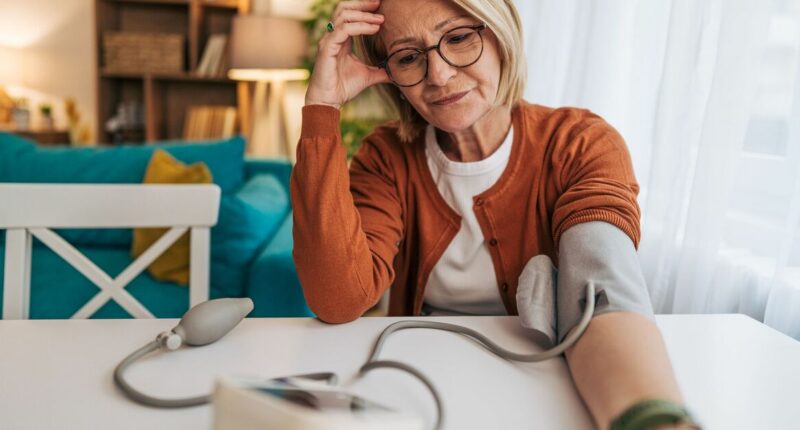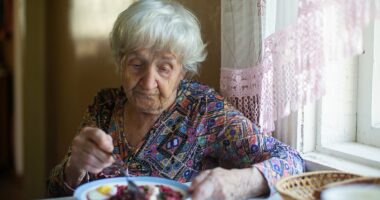Share this @internewscast.com
Blood pressure reflects the force of your blood against the artery walls as your heart pumps it around the body. Maintaining healthy blood pressure is crucial for the prevention of heart attacks and strokes, and many common diseases. If you have high blood pressure — dubbed a “silent killer” because it often has no symptoms — the force of your blood flow against the artery walls can damage blood vessels making them weak, stiff or narrower, and can cause your heart to lose strength.
Meanwhile, low blood pressure reduces the flow of oxygenated blood to the brain, which can cause symptoms including dizziness, lightheadedness, blurred vision and fainting. In the UK, over 14 million adults are estimated to have high blood pressure, with many unaware of their problem and the possible health risks. And the UK’s ongoing heatwave could bring particular challenges when it comes to blood pressure.
How does hot weather affect blood pressure?
In hot conditions, blood vessels near the skin’s surface dilate, or widen, to release excess heat. This reduces the resistance to blood flow, causing blood pressure to drop.
Sweating also involves fluid loss which can cause dehydration and, in turn, cause a decrease in blood volume which lowers blood pressure.
Dementia UK has warned that falling blood pressure can increase risk of falls and fainting. The British Heart Foundation has advised that it could also put people with heart and circulatory diseases at greater risk of health complications and even death.
Ruth Goss, Senior Cardiac Nurse at the British Heart Foundation, said drinking plenty of fluids can help prevent your blood pressure dropping too much. She added: “Water is best but milk, sports drinks, diluted squash, fruit juice, tea, and coffee all count. If you have been told to restrict your fluid intake, for example if you have heart failure, speak to your GP or heart failure nurse about other ways to keep cool.”
The greatest risks are seen for those who are aged over 50, overweight or have heart, lung or kidney conditions, according to the Mayo Clinic.
Blood pressure medications can affect your ability to cope with the heat
Some medications can impair the body’s ability to regulate temperature, potentially leading to heat-related illnesses.
The Medicines and Healthcare products Regulatory Agency (MHRA) has issued advice for patients taking common medications during the UK heatwave — including blood pressure drugs.
Blood pressure medicines such as ACE inhibitors, beta-blockers, or calcium channel blockers can make it harder for your body to regulate temperature, especially during sudden hot spells.
ACE inhibitors can even suppress your natural thirst response, reducing the urge to drink water and increasing risk of dehydration.
Warning signs that your body is not coping well with the heat include cold, clammy skin, confusion, dizziness, disorientation, rapid pulse, fatigue and headache.
How to stay safe during a heatwave
Alzheimer’s Society has shared top tips to keep people with dementia safe in the hot weather — and they could also benefit anyone spending time outdoors.
The six steps are:
- Dress appropriately – Ensure the person living with dementia is wearing light-coloured, loose-fitting clothes made from natural fibres help prevent overheating. A hat or cap for outside is essential.
- Keep homes cool – Close the curtains and blinds during the day, especially in sunny, south-facing rooms. Open windows in the evening to let warm air out and cooler air in.
- Avoid the midday sun – Make sure they stay out of the sun during the hottest part of the day (11am-3pm). When outdoors, seek shade, wear a hat and apply high-factor sunscreen regularly.
- Find ways to cool off – Try putting a frozen bottle of water or ice pack next to a fan for DIY air-conditioning, or place a washcloth and iced water nearby.
- Combat dehydration – Leave glasses or jugs of water within easy reach, share a drink with the person, leave reminders to drink, and provide high water content foods such as ice lollies, milk jellies, melon and yogurt. “Water sweets”, such as Jelly Drops, can also help the person stay hydrated.
- Ask others to help – If you don’t live near the person or are worried about someone, ask a friend or neighbour to check in.
Angelo Makri, senior knowledge officer for wellbeing at Alzheimer’s Society, said: “As the temperatures rise this week, we are urging families and carers to check in on people with dementia to make sure they are staying hydrated, wearing light clothes and keeping out of direct sun.
“Popping round to check on a neighbour, friend or family member with dementia can help keep them safe during the hot weather.”














